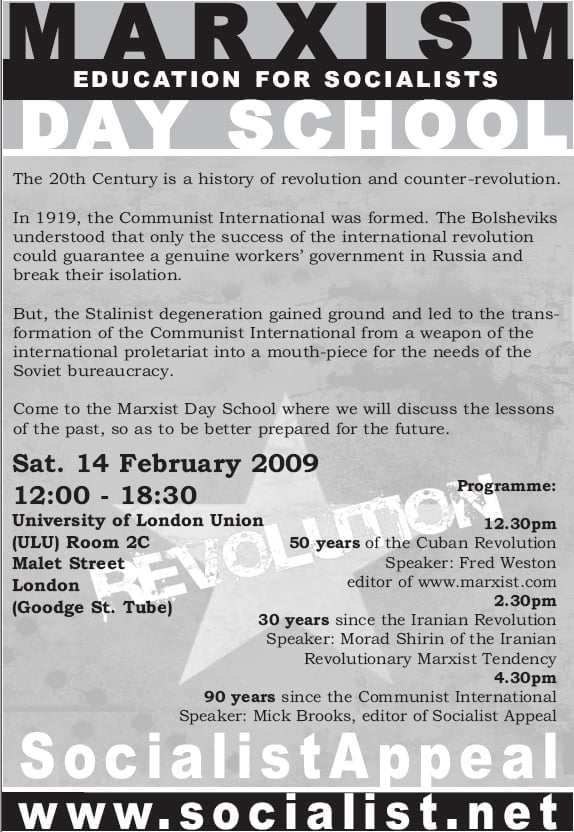Even the bourgeois press has admitted that
the sudden shift in world economic fortunes has brought Marxism ‘back from the
dead’ – the Sunday Times ran an article last week under the title ‘The credit
crunch is bringing Marxism back into fashion’. From our perspective, Marxism is
not a fashion or a strange breed of animal, as the bourgeoisie like to kid
themselves, but the only answer to today’s problems. And as the deep crisis of
world capitalism comes more and more to the surface, more and more people will
seek our ideas. This was shown by the turnout of more than 30 at ULU Marxist
Society and Socialist Appeal’s Marxist
Day School on Saturday 12th
July.
 The day began at 12.00 with Fred Weston
The day began at 12.00 with Fred Weston
leading off on the topic ‘Marxism and the Black Struggle’. Fred started off
with the fact that there is no scientific basis for racism whatsoever, and that
such an ideology is a product of social relations, and specifically capitalist
social relations. For example, under different social conditions, such as the Roman Empire, the slaves were largely of similar
ethnicity to the slave owners, and at the same time there were African Roman
Emperors, such as Septimius Severus. Racism is therefore not some natural or an
innate human trait.
However, all class societies have
inequality and oppression at their centre, and need an ideology to justify
this. Capitalism has always gone hand in hand with the ideology of racism. Fred
explained that the cause of this lies in capitalism’s historical genesis through
the revival of slavery, its continued inability to give decent jobs and
conditions to all, and its need to divide the working class in order to remain
dominant. For this reason Fred argued that Marxists must strive for maximum
unity of the working class and fight all tendencies towards working class
division.
 Then Jon Avis led off on ‘Stalinism and
Then Jon Avis led off on ‘Stalinism and
Bolshevism’. He focused on the ideas of Stalinism as the degeneration of the
worker’s state and Bolshevik Party due the chronically low levels of production
in the Russian economy – he pointed out that after the civil war the Soviet
state’s production was one fifth of what it had been in 1913. This led to
generalised want, the struggle for resources, and the weakening of the
proletariat, which enabled the old Tsarist bureaucracy to re-enter the state
free from working class control. Jon then added that this represented a
counter-revolutionary usurpation of power, the contrast between Bolshevism and
Stalinism being represented by the fact that at the end of the purges, only
Stalin remained alive out of those who led the October Revolution. Members of
the audience then debated these ideas and how we should understand Stalinism,
with one arguing that the 1918 abolition of the Constituent Assembly
represented the first move away from democracy. Another comrade criticised this
argument, since the real centre of revolutionary democracy was the Soviets.
 Finally Rob Sewell spoke on ‘Marxism Vs
Finally Rob Sewell spoke on ‘Marxism Vs
Ultra-leftism’. This was in relation to the sectarian idea of leaving mass trade
unions or workers’ parties when the leadership is conservative, to set up small
‘revolutionary’ unions and parties on the sidelines. He characterised this as
essentially giving up on the struggle for the leadership of the working class.
He criticised the tendency to denounce right wing labour leaders when there is
no significant organised alternative, rather than placing demands on them. He
also argued that it was utopian to think that the mass of the working class is
going to vote for tiny parties on the fringes, however good their politics, and
would instead simply abstain. Such sectarian policies lead to frustration, and
as a result these revolutionaries can quickly turn to opportunism as a quick
solution. The audience discussed these ideas in relation to the British labour
movement, with one trade union militant asking how non-sectarians who operate
in the Labour Party could avoid being expelled from the party, as Militant
supporters were. Rob answered that there is no guarantee with this, just as there
is no guarantee that revolution will win over counterrevolution in any one
situation. Ultimately it depends on the class balance of forces.
The day school was a success, with a good
attendance, debate and considerable money raised in the international appeal.






